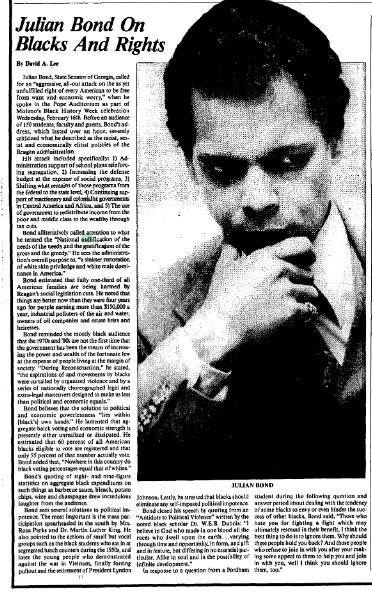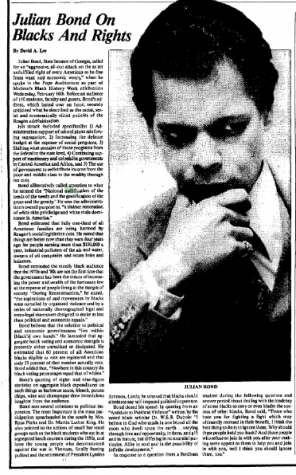
THE OBSERVER ARCHIVES
“Julian Bond on Blacks and Rights”
From News
By David A. Lee

Before an audience of 150 students, faculty and guests, Bond’s address, which lasted over an hour, severely criticized what he described as the racist, sexist and economically elitist policies of the Reagan administration.
Julian Bond, State Senator of Georgia, called for an “aggressive, all-out attack on the as yet unfulfilled right of every American to be free from want and economic worry,” when he spoke in the Pope Auditorium as part of Molimo’s Black History Week celebration Wednesday, February 16th. Before an audience of 150 students, faculty and guests, Bond’s address, which lasted over an hour, severely criticized what he described as the racist, sexist and economically elitist policies of the Reagan administration.
His attack included specifically: 1) Administration support of school plans reinforcing segregation, 2) Increasing the defense budget at the expense of social programs, 3) Shifting what remains of those programs from the federal to the state level, 4) Continuing support of reactionary and colonialist governments in Central America and Africa, and 5) The use of government to redistribute income from the poor and middle class to the wealthy through tax cuts.
Bond alliteratively called attention to what he termed the “National nullification of the needs of the needy and the gratification of the gross and the greedy.” He sees the administration’s overall purpose as, “a sinister restoration of white skin privilege and white male dominance in America.”
Bond estimated that fully one-third of all American families are being harmed by Reagan’s social legislation cuts. He noted that things are better now than they were four years ago for people earning more than $150,000 a year, industrial polluters of the air and water, owners of oil companies and estate heirs and heiresses.
Bond reminded the mostly black audience that the 1970s and ’80s are not the first time that the government has been the means of increasing the power and wealth of the fortunate few at the expense of people living at the margin of society. “During Reconstruction,” he stated, “the aspirations of and movements by blacks were curtailed by organized violence and by a series of nationally choreographed legal and extra-legal maneuvers designed to make us less than political and economic equals.”
Bond believes that the solution to political and economic powerlessness “lies within [black’s] own hands.” He lamented that agregate balck voting and economic strength is presently either unrealized or dissipated. He estimated that 60 percent of all American blacks eligible to vote are registered and that only 55 percent of that number actually vote. Bond added that, “Nowhere in this country do black voting percentages equal that of whites.”
Bond’s quoting of eight- and nine-figure statistics on aggregate black expenditures on such things as barbecue sauce, bleach, potato chips, wine and champagne drew incredulous laughter from the audience.
Bond sees several solutions to political impotence. The most important is the mass participation spearheaded in the south by Mrs. Rose Parks and Dr. Martin Luther King. He also pointed to the actions of small but vocal groups such as the black students who sat in at segregated lunch counters during the 1950s, and later the young people who demonstrated against the war in Vietnam, finally forcing pullout and the retirement of President Lyndon Johnson. Lastly, he stressed that blacks should eliminate any self-imposed political impotence.
Bond closed his speech by quoting from an “Antidote to Political Violence” written by the noted black scholar Dr. W.E.B. DuBois: “I believe in God who made in one blood all the races who dwell upon the earth…varying through time and opportunity, in form, and gift and in feature, but differing in no essential particular. Alike in soul and in the possibility of infinite development.”
In response to a question from a Fordham student during the following question and answer period about dealing with the tendency of some blacks to envy or even hinder the success of other blacks, Bond said, “Those who hate you for fighting a fight which may ultimately resound in their benefit, I think the best thing to do is ignore them. Why should these people hold you back? And those people who refuse to join in with you after your making some appeal to themto help you and join in with you, well I think you should ignore them, too.”